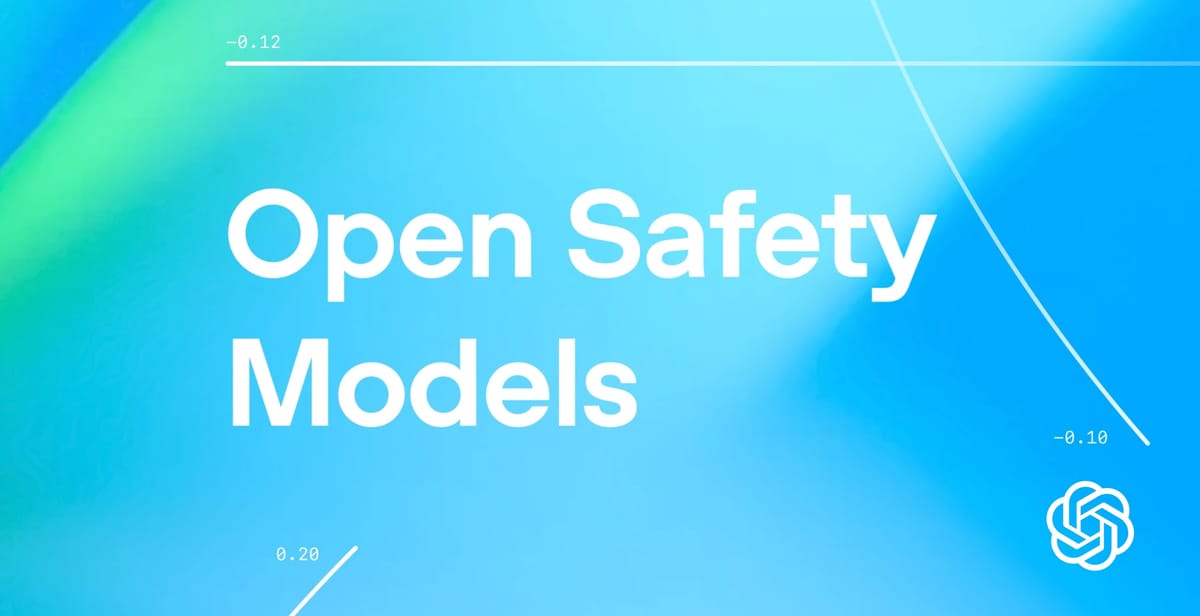OpenAI shipped gpt-oss-safeguard today, a pair of open-weight models (120B and 20B parameters) designed to classify content safety based on policies you define at runtime. Unlike traditional safety classifiers that bake policies into training, these models read your rules when you need them and show their reasoning as they work.
Key Points:
- OpenAI released gpt-oss-safeguard (120B and 20B), open-weight reasoning models that interpret safety policies at inference time rather than requiring retraining when policies change
- Part of partnership with ROOST, a $27M nonprofit building open-source safety infrastructure for platforms that lack access to enterprise moderation tools
- Models outperform GPT-5 on multi-policy benchmarks but OpenAI acknowledges traditional classifiers trained on large datasets still perform better on complex classification tasks—best suited for emerging risks, policy flexibility, and cases where explainability matters more than speed
The difference matters most for fast-moving platforms. When a new risk emerges—say, a gaming forum needs to crack down on exploit-sharing or a review site spots a wave of fake testimonials—traditional classifiers require complete retraining. These models let you update rules and deploy changes in hours, not weeks. OpenAI says they're using this approach internally and devoting up to 16% of total compute to safety reasoning in recent launches.
The models launch alongside a new community hub from ROOST (Robust Open Online Safety Tools), the $27 million nonprofit formed by OpenAI, Google, Discord, and Roblox in February. ROOST aims to build shared safety infrastructure—think open-source moderation consoles, policy templates, and evaluation datasets—so smaller platforms don't have to reinvent everything from scratch.
On OpenAI's internal multi-policy benchmark, gpt-oss-safeguard-120b outperformed GPT-5 despite being significantly smaller (46.3% vs 43.2% accuracy). But OpenAI is direct in the technical report: classifiers trained on tens of thousands of labeled examples still outperform these reasoning models on complex classification tasks. The reasoning approach works best when you lack training data, need policy flexibility, or are dealing with nuanced, emerging risks where explainability matters more than raw speed.
The content moderation market has been dominated by enterprise vendors like Checkstep and Hive, or big tech APIs from Microsoft Azure and Amazon. Most rely on traditional classifiers trained on thousands of labeled examples tied to fixed policies. When policies shift, you retrain everything.
OpenAI's approach—reading policies at inference time and using chain-of-thought to explain decisions—addresses a real friction point for platforms dealing with evolving risks. The catch: the chain-of-thought reasoning isn't guaranteed to be accurate. OpenAI's technical report warns the reasoning can contain "hallucinated content" that doesn't reflect the actual policy being interpreted, which complicates the transparency benefit.
There's also the compute cost. These models are slower and more resource-intensive than traditional classifiers. OpenAI handles this by using fast classifiers to triage content, then applying reasoning models selectively. Smaller organizations will need similar strategies—these aren't drop-in replacements for existing moderation systems.
ROOST's involvement suggests this isn't just about releasing code but building an ecosystem where platforms can share policies and evaluation data openly. The models are available under Apache 2.0 license on Hugging Face, and OpenAI is hosting a hackathon with ROOST and Hugging Face on December 8 in San Francisco.

